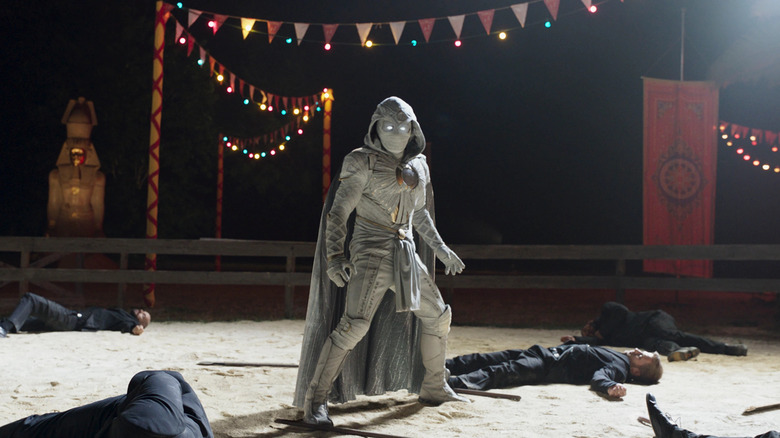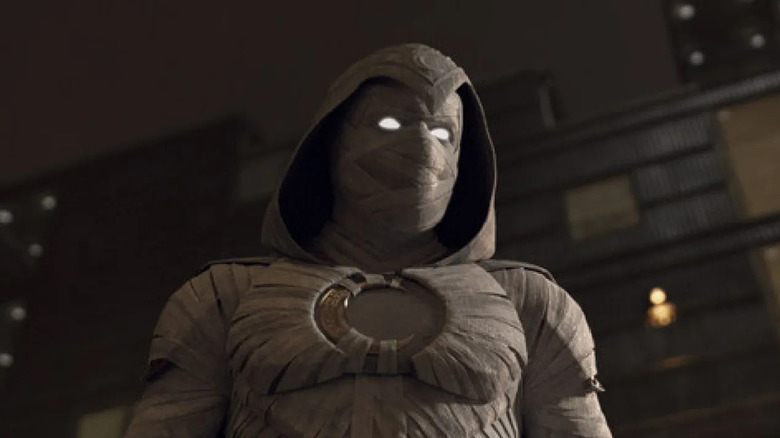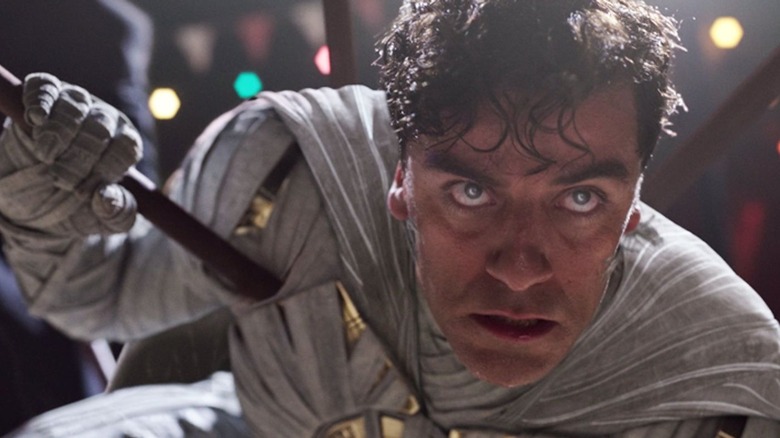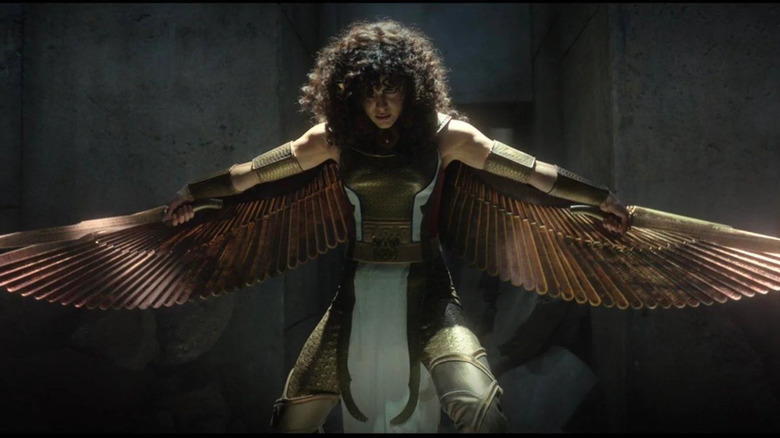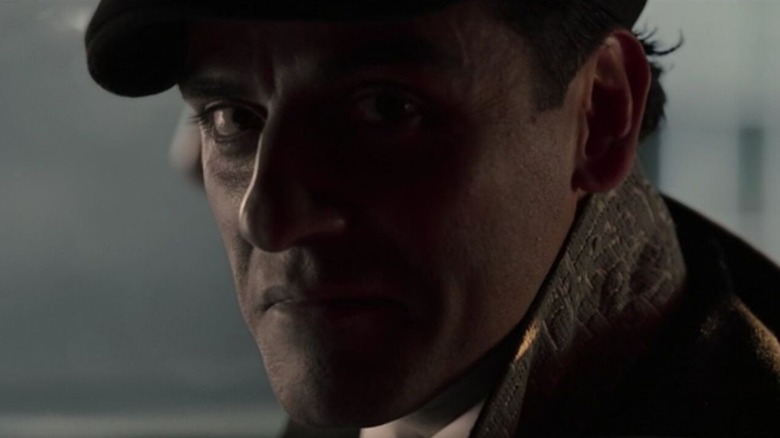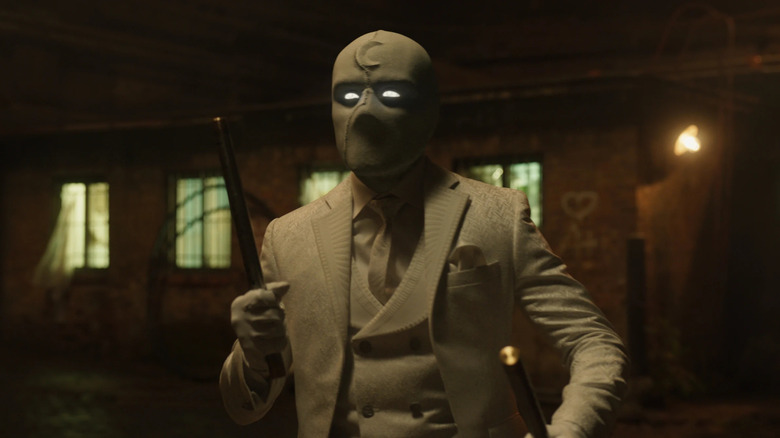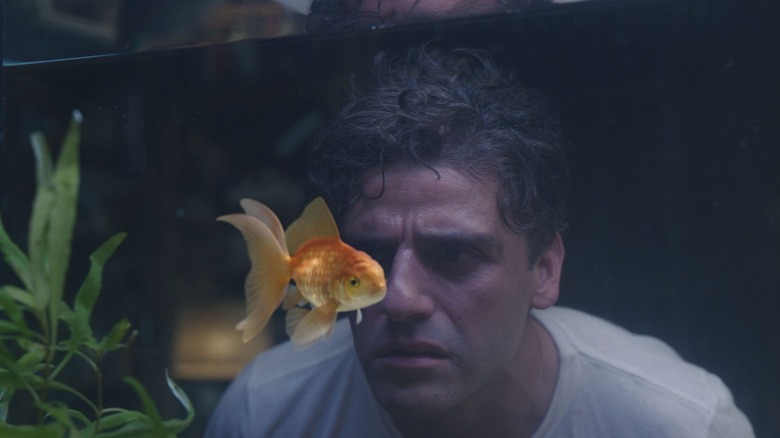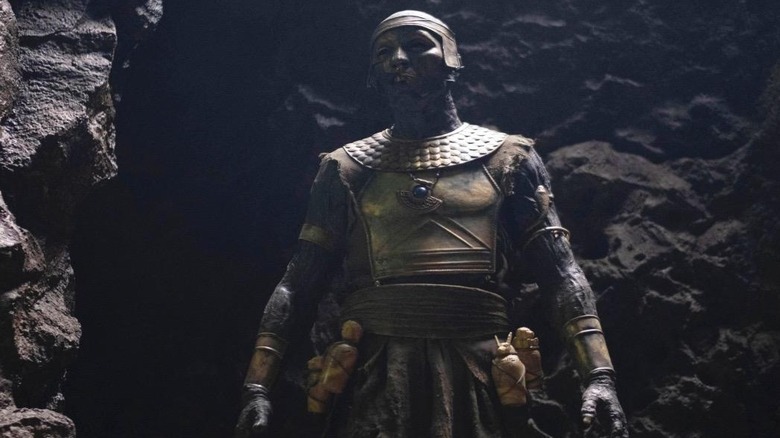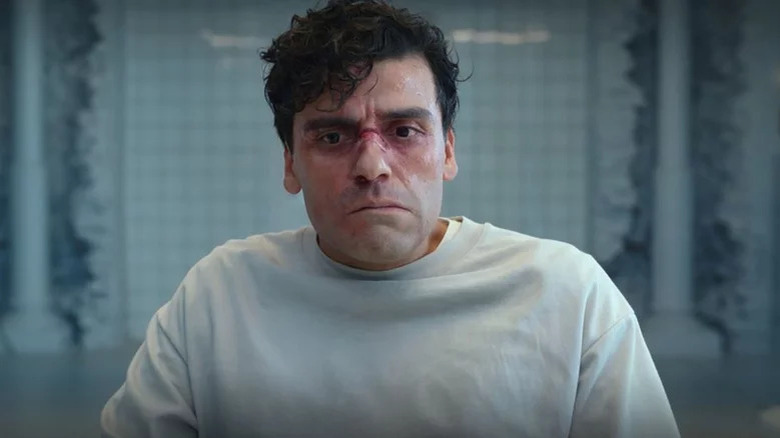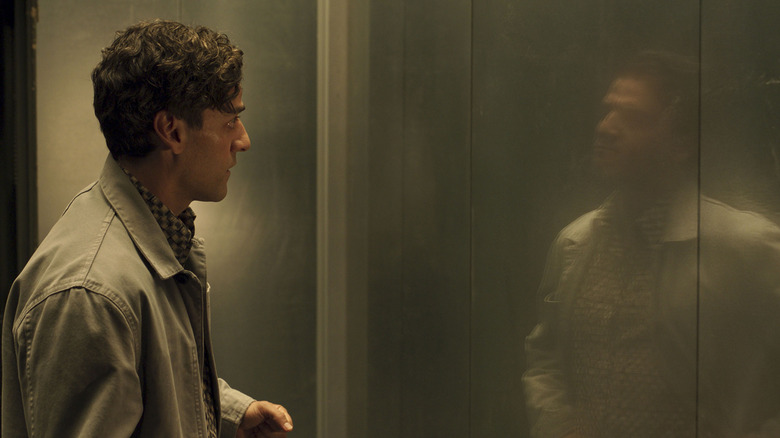Every Moon Knight Season 1 Episode Ranked Worst To Best
It's increasingly easy for casual fans and cinephiles alike to hate Marvel Studios. The monolithic production company has been in its imperialist phase for a decade-plus, reshaping and homogenizing the modern moviegoing landscape. You can hate Marvel for that. Marvel stans seem increasingly irked by criticism or changes to the mighty Marvel manner. Folks on both sides of MCU Twitter are arguing about whether "Doctor Strange in the Multiverse of Madness" is good or not before 95% of the world has seen the movie, and its writer, Michael Waldron, claims the movie's script was "created out of chaos." Reasons to hate Marvel — you've got them.
Those reasons, good as they are, make it difficult to discuss the latest Marvel film or show with objectivity. I also think it's achievable. In the case of "Moon Knight," for example, the question is this: Did the show, created by Jeremy Slater, tell the story it set out to tell, and did it tell that story well?
The answer is yes and no. "Moon Knight" is the kind of Marvel show I never thought they'd make, a genuinely stand-alone effort that is, ultimately, more character piece than not. It explores trauma and dissociation deftly but doesn't lend its cape and cowl moments necessary purpose. It's a flawed, wrenching, weird, and wonderful piece. If Marvel is going to dominate the pop culture conversation for the next 10 years, I would hope for nothing less than that.
Here is every episode of "Moon Knight," ranked.
6. Episode 3 — The Friendly Type
Why doesn't "The Friendly Type" work? For much of its run-time, "The Friendly Type" is ... fine. It opens with a genuinely sharp rooftop fight sequence, replete with "Goldfish Problem" callbacks. We get quality downtime with Marc and Layla (Oscar Isaac and May Calamawy), a pantheon of Egyptian gods, and a "Moon Knight versus horse-riding bodyguards" set piece that is both memorable and strange. So what's actually missing? The "why."
Yes, Marc and Layla need to find Ammit's (Saba Mubarak) tomb to stop Harrow (Ethan Hawke), and that means visiting a dashing and threatening antiquities dealer Anton Mogart (Gaspard Ulliel). These are just distractions. Khonshu (F. Murray Abraham) turns the night sky back to the evening that Ammit was buried and finds her tomb, rendering Steven and Layla's battle with Mogart pointless. But there are other reasons these adventures feel so thin.
Marc's time as Moon Knight is a means to avoid his pain. More specifically, the pain Marc inflicts as Khonshu's fist gives him a purpose life no longer can. When he's adventuring in the desert with Layla (the wife he loves, is divorcing, and has rarely told the truth to), it helps him run from the heart of who he is. Unfortunately, his avoidance also diverts the show from its best self. "Moon Knight" isn't as interested in gods and monsters as it thinks, and "The Friendly Type" is proof. This episode should work. As "The Tomb" proves one installment later, "The Friendly Type" is all hot air — sound and fury signifying nothing.
5. Episode 6 — Gods and Monsters
After six weeks of mystery-box plotting, metaphysical asylums, and busting Hollywood myths about Egyptian culture, "Moon Knight" arrives at its coup de grace — a CGI alligator.
Therein lies the issue which plagues "Gods and Monsters," a half-great season finale that breaks its leg while sticking the landing. "Moon Knight" was never about heroics. Harrow, Ammit, and their quest to cleanse the world of chaos were thematic means to an end. The show's heart beats for Marc Spector and Steven Grant. "Episode 6" serves them well, arriving at a layered and lovely portrait of living with (and not dissociating from) your demons, mental illness, or both. When Marc leaves the Field of Reeds to take Steven's hand on the sands of the Duat and when Steven and Marc leave the asylum together in one body, the show's visual language and emotional subtext soar.
Unfortunately, Jeremy Slater's show also has to balance its scales. And to the credit of "Episode 6," some of its cape and cowl antics are great. The close-quarters fight between Moon Knight, Layla (now Taweret's avatar!), and an Ammit-powered Harrow is objectively excellent, a thrilling blend of slick effects and grimy combat. The slugfest between Ammit herself and the newly freed Khonshu? Not so much. It's a weightless kaiju riff that lacks stakes or heart. "In particular, Ammit's rendering looks like this show's budget stretched to breaking. A great show would have made its gods more compelling. "Moon Knight" never did. It does, however, offer a great setup for a second season.
Gods and Monsters also gives Layla her due...
If Oscar Issac was the unquestionable MVP of "Moon Knight" Season 1, May Calamawy was its sixth man. Layla was the first character to come off the show's proverbial bench and elevate it instantly, adding dimension to both Steven and Marc while being instantly compelling on her own. Layla took down a car full of heavies with one flare. She was frequently adorable. And, in the ultimate melding of "Moon Knight" fan favorites, Layla became Taweret's avatar in "Episode 6," sporting a gold suit with Falcon-like wings.
It's a moment that is both surprising and earned, if only through Calamawy's exceptional dual performance as Layla and Taweret-speaking-through-Layla. Seeing more of her as, in the words of a citizen she saves,"an Egyptian superhero" would be welcome. Layla endured the loss of her father, the lies of Marc, and the sinister advances of Khonshu to be respected and loved by a goddess. Give the woman her laurels.
...and introduces Jake Lockley.
Layla isn't the only character who evolves in the final moments of "Moon Knight," though. In the show's disquieting post- final credits sequence, Jeremy Slater and company confirm what many suspected. Jake Lockley is in play. The scene opens on Harrow drugged up and wheelchair-bound in Sienkiewicz Psychiatric Hospital (a winking nod to Moon Knight creator Bill Sienkiewicz). A gloved figure comes and whisks Harrow out. Harrow notices dead orderlies scattered in the halls. He's then shoved into a limo where Khonshu sits, monologuing that Layla was never who he wanted for his avatar. It's been Jake, Marc's most troubled self, Khonshu was after all along. Jake shoots Harrow in the head. The limo drives off.
That is, to put it mildly, a lot. Upon further consideration, though, I think it also works tremendously. The existence of Jake works on several levels. It honors the show that's come before him (Marc and Steven blacked out on more than one occasion and woke to indescribable violence neither could take credit for; Jake was inevitable). The existence of Jake doesn't negate Marc and Steven's healing. As anyone who's struggled with mental illness can attest (myself included), living with a disorder is often discovering there's a brand new challenge just around the bend. We wrestle with ourselves to find peace, then wrestle once again. Our time in the Field of Reeds is temporary. This is Jake Lockley, and his function as a dark deus ex-machina is ingenious.
Beyond that, Jake executing Harrow confirms Khonshu is just as manipulative, opportunistic, and awful as audiences thought he was. Let's not mince words. Khonshu appealed to Marc at his lowest and most faithless point. He chose him as an avatar to weaponize his trauma with aims not dissimilar from those of the show's supposed "bad guys." "Moon Knight" owns this and is, ultimately, unblinking in its depiction of a god getting their way.
4. Episode 2 — Summon the Suit
The issues with "Summon The Suit" begin and end with its title. The Justin Benson and Aaron Moorehead-directed installment assigns itself a difficult task: Set up the mythology of Moon Knight, introduce Layla, and explain why Harrow is eliminating souls from Earth with the wave of a staff. It does all this. It also stages a thrilling rooftop chase and one of the series' most harrowing scenes. The episode threatens to collapse under its own weight more than once. Thankfully, it doesn't. "Summon the Suit" improves tremendously upon rewatch. It's easier to appreciate the lengths it goes to disguise exposition and its sneaky, heart-shattering foreshadowing. An example: Layla observes that Marc and his mom are talking again. Steven, currently in control of Marc's body, is confused by this, as is the audience. In retrospect, this throwaway line reinforces Steven's narrative, setting up the gut-punch that is his mother's death while revealing that Marc has been lying to Layla about his mom's passing for months. Heart-shattering!
The issue "Summon The Suit" runs into is the suit itself. Though Moon Knight evading a jackal on London's rooftops is gorgeously shot, blending gothic imagery with kinetic camerawork and establishing the hero's athletic prowess, the CGI is a let down as is Khonshu. "Moon Knight" is a different show when it takes a whiplash turn into super-heroics. This show doesn't work as well when its speeding down more traditional comic-book lanes.
3. Episode 1 — The Goldfish Problem
Steven Grant can't tell the difference between his waking life and his dreams. By the end of "The Goldfish Problem," neither can anyone watching "Moon Knight." The Mohammed Diab helmed and Jeremy Slater-penned episode has a tricky task to accomplish: knock its audience off-balance while laying the groundwork for a globe-spanning adventure. It does so effortlessly. How effortlessly? If you didn't know, "Moon Knight" is the latest superhero show from two of Hollywood's largest powerhouses. The reveal of a transformed Marc going HAM on a jackal would be genuinely shocking.
Superhero conventions don't rear their head in "The Goldfish Problem," an episode in which the largest and most traditional set-piece is really a thrilling excuse to show us how fractured Steven is. Following a montage that ingeniously captures the strung-out energy and unrest of insomnia, Steven wakes outside a village near Latervia with a voice in his head taunting "Go, back to sleep, worm!" Moments later, a cult leader is confronting him about a scarab. Shortly after that, Steven blacks out and dismantles a horde of goons. The point is the time that's missing, not the violence we catch in glimpses. Steven is our audience surrogate. When "The Goldfish Problem" ends, we're just as invested in what's going on with him as he is — even if we can't make sense of it.
That's one mark of a well-plotted, well-executed show, and "Moon Knight" gets high marks for "The Goldfish Problem," indeed.
2. Episode 4 — The Tomb
MCU shows have been a mixed bag. "Loki" is one of the decade's best television efforts, but " The Falcon & Winter Soldier" muddied its storytelling and political messaging. "WandaVision" is three-fourths of a tremendous show that abandons ambition for franchise expansion. Yet, all three of these shows yield breathtaking, top-tier installments as do "Hawkeye" and "What If." If Marvel has struggled to translate their cinematic universe to the small screen, its growing pains are already yielding gold that hints at more consistent riches to come. The best of Marvel TV can stand beside almost anything else on television.
So while it pains me to say that "The Tomb," the fourth episode of "Moon Knight," never reaches the storytelling highs of "A Very Special Episode" or "Journey Into Mystery," it comes so darn close that it's thrilling. Directors Justin Benson and Aaron Moorhead unleash the full breadth of their horror filmmaking powers, staging sequences that recall "As Above So Below" and "The Mummy" in equal measure before dropping the hammer in the episode's mind-bending third act.
"The Tomb" is proof that Marvel can scale down without sacrificing scope. Its effects feel more practical than not. The clever use of VHS tape footage is the setup for a head-spinning and devastating reveal. If "The Tomb" wasn't the "Moon Knight" show you wanted, that's fair but calling it anything less than a successful swing for the fences isn't.
1. Episode 5 — Asylum
There's been a lot of wonderful writing concerning the show "Moon Knight" is and the show it isn't. "Moon Knight" is, in the words of our own B.J. Colangelo, "spot on" in its depiction of mental illness and healing (until it isn't.) "Moon Knight" is also a show that made major continuity changes to the precise nature of Marc Spector's Jewish identity. I won't get into the latter for brevity's sake, but I encourage you to read about the plethora of voices offering their takes on the issue (both supportive and angry).
"Asylum," at last, is the show that "Moon Knight" really wants to be. The whole series has been building to it. A rewatch confirms every episode anticipates it, from the young museum attendee asking Steven about the Field of Reeds to every utterance of "laters gators." "Moon Knight" was always headed towards "Asylum," and viewers couldn't anticipate how wrenching or on-point the destination would be.
Simply put, "Asylum" is head-spinning television as pop art. It's arguably the most emotionally rich hour of television Marvel's produced to date. Oscar Issac delivers awards-caliber work throughout it. Most importantly, it succeeds on its own brazen terms. The "Moon Knight" creative team hinged their penultimate episode on a deep dive into Marc's trauma, which doubled as a treatise on both dissociation and forgiveness. They pulled it off.
Why Asylum works
To be clear, "Moon Knight" cannot thread the needle between this episode's strain of incisive character study and its superhero elements. What "Asylum" makes clear is that neither can Marc Spector. The episode posits, chillingly, that Moon Knight is Marc's organizing principle. In the words of Ethan Hawke's Harrow (now an asylum-bound psychiatrist), "The struggling mind will often build places to seek shelter for different aspects of the self from our most traumatic memories." When Marc meets Khonshu, he has been hiding from himself by being a mercenary. Tragedy, abuse, and trauma have stripped him of any other places to hide. He has no faith in himself. It is no wonder that he accepts the help of a malevolent deity who promises purpose. That's what superhero shows do, too. At their best, they inspire us to reach for greatness within. At worst, they're emotional narcotics. Khonshu supplied Marc with the high of motive and ways to hide his truth. In "Asylum," that's all stripped away — for Marc and the viewer.
That's what will linger with me when I think of "Moon Knight. For one and a half episodes, it deconstructed the superhero story to confront its hero's hurting heart and challenge its audience's relationship with themselves and the medium. If comic book movies and shows are going to remain almost omnipresent, we should be thankful for ones that ask why they are.
